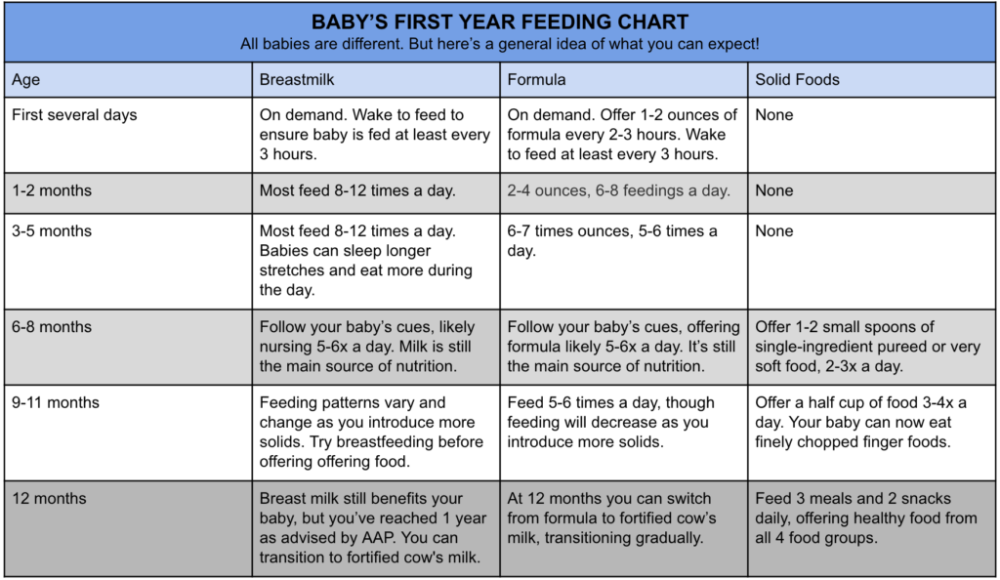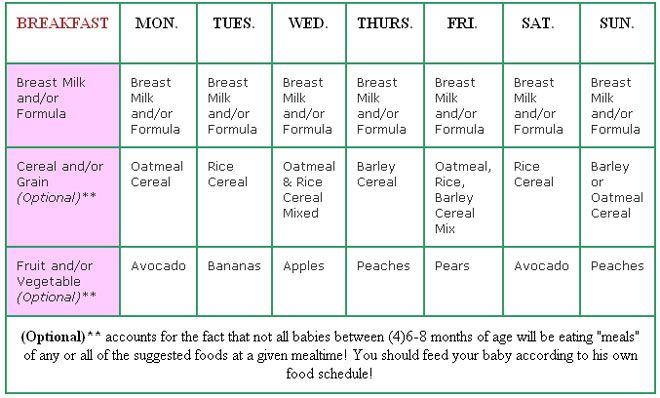How to get your baby into a feeding routine
Baby schedules: When to start a daily routine with your baby
Many parents find that getting into a daily routine with their baby makes life much easier. To create a general schedule, observe when your baby naturally likes to eat, sleep, and play. Newborns eat and sleep around the clock, but starting around 2 to 4 months, you may start to observe patterns and establish a routine. Start by practicing a consistent bedtime routine every night, and plan to do roughly the same things at the same time every day.
Why are baby schedules useful?
A baby's needs aren't that complicated – food, sleep, play, and love pretty much sums it up. But knowing what your baby requires when, and how much of it, can be a real challenge. Not to mention balancing your baby's needs with your own and those of older children and other family members.
Many parents find that getting into a regular routine or schedule with their baby makes life much easier: It's almost like developing a personalized how-to manual for your child. As a parent, you'll have a predictable pattern for your days with your little one. And your baby will know what to expect – for example, that they get a bottle after their morning nap, then playtime or an outing.
Babies like to know that certain things will happen at a certain time each day. An added bonus: When you're ready to try leaving your baby with a sitter, the transition will be easier. Your baby will be reassured by their usual routine, and your caregiver will be able to anticipate their hunger, sleepiness, or desire to play or go out.
When to start a routine with your baby
Experts disagree on when and how to establish a routine – and even on whether you need a set schedule for your baby. But many say that babies are ready for a general schedule between 2 and 4 months of age.
Most infants' sleeping and feeding habits become more consistent and predictable after three or four months. You may want to take this opportunity to encourage your baby to follow a more defined schedule.
Your baby may fall into fairly predictable patterns long before this, however. If that's the case, you can gently encourage your baby's emerging routine.
Tracking your baby's eating, sleeping, and alert times can give you an understanding of their natural rhythms and enable you to pinpoint developing patterns. In the days following delivery, many parents begin to write down or log when their newborn eats, when they poop and pee, when they sleep and for how long, and so on.
When figuring out your baby's schedule, it's essential that their well-being comes first. That means following the advice of your baby's doctor, plus your gut feeling and common sense, to determine what your baby needs when – no matter what a particular expert, book, or method says.
During the newborn period, it's especially important that your baby get enough breast milk or formula to avoid problems like poor weight gain and dehydration. Babies should be fed when they're hungry – that is, fed on demand – according to the American Academy of Pediatrics (AAP). This means looking for your baby's hunger cues. Never withhold food or sleep when your baby seems to need it because it's not the "right" time.
This means looking for your baby's hunger cues. Never withhold food or sleep when your baby seems to need it because it's not the "right" time.
Advertisement | page continues below
How to establish a baby schedule
Getting into a regular schedule for sleep, feeding, and activities can make life easier for you and your baby. But how to start? Below, find some helpful guidelines for establishing a routine that works.
Get your baby used to a bedtime routine early on
Babies don't have regular sleep cycles until around 6 months old, according to the AAP. While you can't force babies to be predictable in the first few months, you can develop a consistent routine that's in sync with your baby's natural rhythms. The easiest way to develop a regular bedtime is to create a bedtime routine that you and your baby can depend on night after night.
Keep the routine simple – for example, a warm bath, jammies, a feeding, then lights-out. It's fine if feeding lulls your baby to sleep in the early months, but by 3 or 4 months you may want to try putting them down awake so they'll learn to fall asleep on their own. For more helpful information on establishing a bedtime routine, as well as other sleep tips, check out Baby Sleep 101, our premium class led by a pediatric sleep doctor from BabyCenter Courses.
For more helpful information on establishing a bedtime routine, as well as other sleep tips, check out Baby Sleep 101, our premium class led by a pediatric sleep doctor from BabyCenter Courses.
Teach your baby the difference between night and day
Many babies mix up their days and nights until about 3 to 4 months, sleeping long stretches during the day only to perk up once the sun goes down. Helping your baby learn to tell day from night is a key first step to getting into a workable routine.
Learn to read your baby's cues
Websites, books, your baby's doctor, and other parents can all help as you figure out an appropriate schedule for your baby. But your child is the most important guide and will tell you what they need – if you learn to read their cues.
Learning what your baby needs when takes time and patience. But you'll see patterns emerge over time. And if you log your baby's naps, feedings, and active times, you can use this record to come up with a timetable for doing things.
When starting out, put your baby's schedule first
If you're encouraging your baby to follow a schedule or observing their patterns to figure out a routine that works, make this process a top priority for at least the first couple of weeks. Avoid deviating from the routine with vacations, meals on the go, or outings that push naptime back.
Once you establish a pattern for your baby's sleeping, awake, and feeding times, changing things for an afternoon isn't likely to undo their habits. But it's best to keep your baby's schedule as consistent as possible while they're getting used to it.
Expect changes during growth spurts and milestones
Your child accomplishes so much in the first year. They'll nearly triple their weight and achieve some major feats like sitting up, crawling, and perhaps even walking.
During periods of growth or when they're working to achieve a new milestone, don't be surprised if your baby diverges from their usual routine. They may be hungrier than usual, need more sleep, or return to waking up several times a night. Babies and toddlers regularly have sleep regressions as they approach big developmental leaps. Hang in there – your baby may be back on schedule shortly, or this may be a sign that you need to adjust your routine.
Babies and toddlers regularly have sleep regressions as they approach big developmental leaps. Hang in there – your baby may be back on schedule shortly, or this may be a sign that you need to adjust your routine.
Adjust your baby's schedule to suit their age
It may feel like just when you've gotten into a predictable groove with your little one, it's time to change it again. As your baby gets older, they'll need fewer daytime naps and more playtime and stimulation. They'll also need to eat solid foods – first just once a day, but eventually several times a day. As these developmental shifts happen, your child's schedule will shift as well.
Don't expect perfection
Some parenting experts set the expectation that your baby's routine will always run like clockwork. And though babies do like consistency, you can expect changes from day to day and as your baby grows.
Sometimes, for whatever reason, your baby will want to skip a nap, have an extra snack, wake up before dawn, and so on. And life happens as well – vacations, older siblings, plans with friends and family, errands you need to take care of, and other factors will all come into play in your daily life with your baby. Variation is okay, as long as your baby is getting the sleep, play, food, care, and love they need to thrive.
And life happens as well – vacations, older siblings, plans with friends and family, errands you need to take care of, and other factors will all come into play in your daily life with your baby. Variation is okay, as long as your baby is getting the sleep, play, food, care, and love they need to thrive.
Sample baby schedules
Wondering how other parents set up their baby's schedule, and what pediatricians recommend? See sample schedules and expert advice for babies of all ages:
- 1- or 2-month-old baby schedules
- 3- or 4-month-old baby schedules
- 5- or 6-month-old baby schedules
- 7- or 8-month-old baby schedules
- 9- or 10-month-old baby schedules
- 11- or 12-month-old baby schedules
And for everything you need to know about baby sleep, check out our monthly sleep schedules:
- Newborn sleep guide
- 2-month-old sleep guide
- 3-month-old sleep guide
- 4-month-old sleep guide
- 5-month-old sleep guide
- 6-month-old sleep guide
- 7-month-old sleep guide
- 8-month-old sleep guide
- 9-month-old sleep guide
- 10-month-old sleep guide
- 11-month-old sleep guide
1- and 2-month-old feeding schedules
At 1 and 2 months old, babies are nursing or taking a bottle around the clock.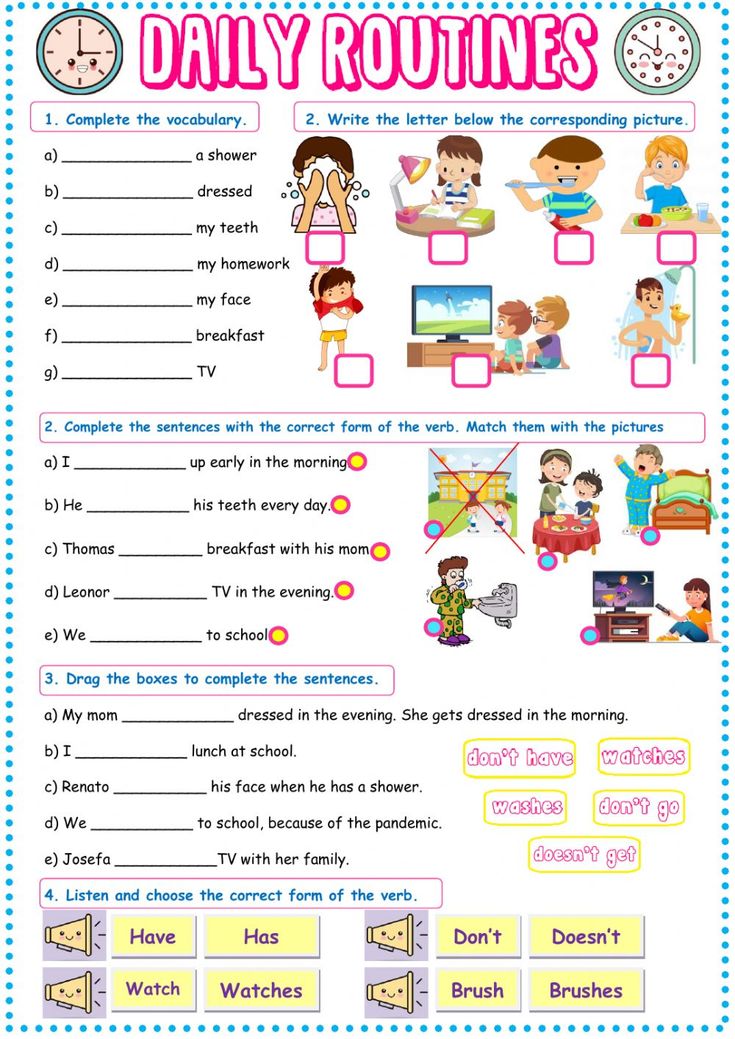 Newborns shouldn't follow a strict schedule, but your baby is probably giving you clues to their natural feeding preferences and rhythms. By breastfeeding and bottle-feeding often and following your baby's hunger cues, you're helping your baby gain weight and grow stronger every day.
Newborns shouldn't follow a strict schedule, but your baby is probably giving you clues to their natural feeding preferences and rhythms. By breastfeeding and bottle-feeding often and following your baby's hunger cues, you're helping your baby gain weight and grow stronger every day.
Getting into a routine with your baby is a process. You'll learn to read your baby's cues to develop a pattern of eating, sleeping, and playing that meets your little one's needs and works for your family.
At 1 and 2 months old, your new baby has a tiny stomach, which means they're not able to eat a lot at each feeding. Instead, they'll eat small amounts fairly often.
Babies this age also sleep a lot, dozing off for an average of 16 hours each day. Roughly half of these hours will happen during the day, the rest at night. But your baby won't sleep for long stretches yet because they need to eat so often. Instead, they'll sleep in short bursts throughout the day and night.
Following a strict feeding schedule isn't recommended – or possible – for young babies. Right now, your goal is to get to know your baby and help them get a healthy start. Feed your baby on demand, watching their hunger cues, so they stay hydrated and put on weight.
Right now, your goal is to get to know your baby and help them get a healthy start. Feed your baby on demand, watching their hunger cues, so they stay hydrated and put on weight.
Even though your daily routine with your baby is all over the place at this point – and that's completely normal – it can be a big help to get a general idea of what these first couple of months will be like. Below, you'll find sample schedules for 1- and 2-month-olds based on those of real parents and reviewed by a pediatrician on our Medical Advisory Board.
Some general things to keep in mind as you're getting used to your baby's feeding patterns:
- Breastfeed babies tend to eat more frequently than formula-fed babies, and may eat less during each feeding.
- Exclusively breastfed babies eat about eight to 12 times over a 24-hour period when they're 1 and 2 months old. Here's how to tell whether your baby's getting enough breast milk.
- Formula-fed babies will eat around six to eight times a day at 1 and 2 months old.
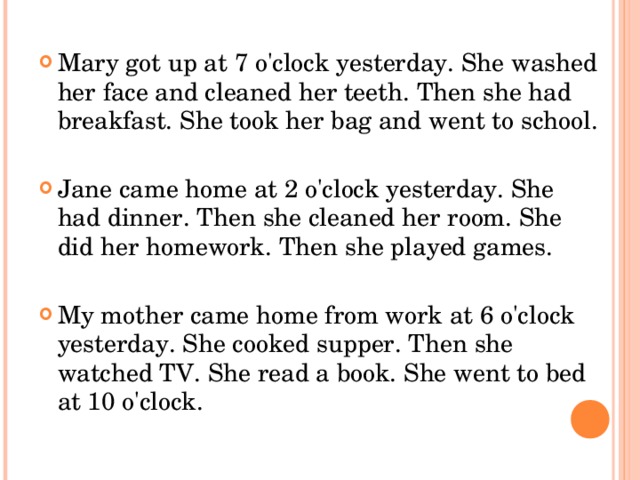 They'll typically have 4 ounces every three to four hours for a total of 24 to 32 ounces of formula each day. Here's how to tell if your baby's getting enough formula.
They'll typically have 4 ounces every three to four hours for a total of 24 to 32 ounces of formula each day. Here's how to tell if your baby's getting enough formula.
Sample 1-month-old feeding schedule
6 a.m.: 4 ounces of formula, then falls back to sleep.
8:30 a.m.: Wakes up, has playtime and tummy time.
Advertisement | page continues below
9 a.m.: 4 ounces of formula.
9:30 a.m.: Playtime on the activity mat or tummy mat.
10 a.m.: Naptime.
12 p.m.: Wakes up, has 4 ounces of formula.
12:30 p.m.: Walk in stroller and playtime.
2 p.m.: 4 ounces of formula, then naptime.
5 p.m.: Wakes up, has 4 ounces of formula.
7:30 p.m.: Bath time and bedtime routine.
8 p.m.: 4 ounces of formula.
12 a.m.: 4 ounces of formula, then back to bed.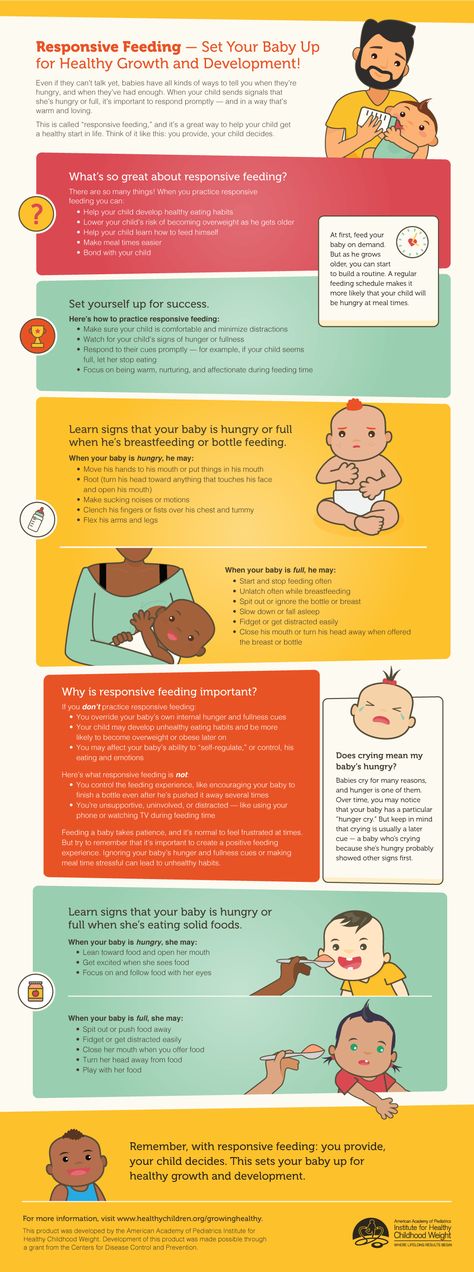
3 a.m.: 4 ounces of formula, then back to bed.
Sample 2-month-old feeding schedule
6 a.m.: Breastfeed for 30 minutes, then back to bed.
7 a.m.: Wakes up, playtime.
8 a.m.: Breastfeed for 25 minutes, then naptime.
9:30 a.m.: Playtime or cuddles with a parent.
10:30 a.m.: Breastfeed for 30 minutes, then naptime.
11:30 a.m.: Walk around neighborhood in stroller.
1 p.m.: Breastfeed for 20 minutes, naptime.
2:30 p.m.: Playtime.
3:15 p.m.: Breastfeed for 30 minutes, then naptime.
5 p.m.: Wakes up, playtime.
6 p.m.: Breastfeed for 30 minutes.
6:30 p.m.: Playtime and bath time.
7:30 p.m.: Breastfeed for 30 minutes, then bedtime routine.
12:30 a.m.: Baby wakes, nurses and falls back asleep.
3 a.m.: Baby wakes, nurses and falls back asleep.
Tips for feeding your 1- or 2-month-old
Whether you're breastfeeding or formula feeding, here are a few basics and tips for getting off to a great start.
- Many babies need help learning to breastfeed. Encourage a healthy latch by holding your breast in one hand and the back of your baby's head in another. Once they open wide, gently push your entire nipple toward the back of your baby's open mouth.
- Milk production is a business of supply and demand. The more you nurse your baby, the more your body gets the message that it needs to make milk. In the earliest days of breastfeeding, it's often best to focus less on scheduling and more on feeding your baby often for 10 to 20 minutes on each side.
- One of the best ways to care for your baby is by taking care of yourself. Breastfeeding mothers need 450 to 500 extra calories a day, so eat plenty of nutrient-dense food. Sleep deprivation and stress could also hurt your milk supply, so rely on your partner, family members, and friends as much as possible when things are tough so you can get some rest.
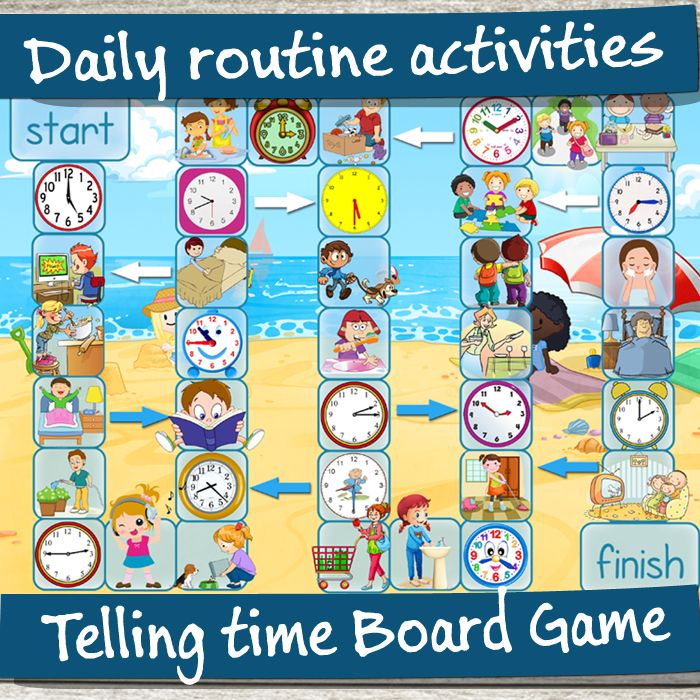
- If you're combination feeding, wait until your baby is about 1 month old if possible before introducing them to a bottle. When you're ready, offer the bottle in place of nursing or after nursing. Considering enlisting help for this task, since some babies may reject the bottle if it comes from the same person who breastfeeds them.
- Whether you're formula feeding or pumping and giving bottles, it's a good idea to practice paced bottle feeding. When it's time to eat, hold your baby more upright to help slow the flow of milk or formula from the bottle. Take a break every half ounce to burp your baby before offering more milk. If your baby is showing signs of being full, stop offering the bottle rather than encouraging them to finish it.
- To ensure your baby is getting enough milk, you can keep track of their feedings and wet and dirty diapers. After their first week of life, it's normal for babies to wet four to eight diapers daily. Your baby's doctor will track your baby's weight closely at all well-baby visits and mark it on their growth chart.
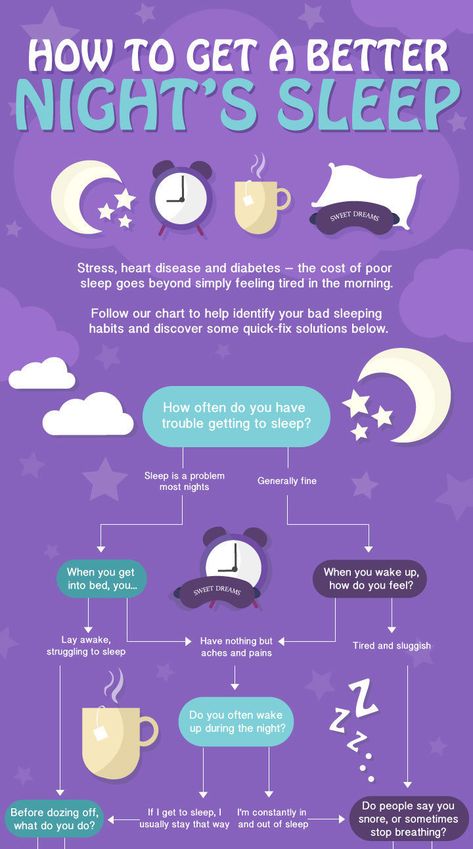 Most 1- and 2-month-old babies gain an average of a half an ounce to an ounce each day.
Most 1- and 2-month-old babies gain an average of a half an ounce to an ounce each day. - If you're breastfeeding, you and your baby are learning a new and challenging skill. Many pediatrician's offices and hospitals offer lactation support groups or one-on-one appointments with a lactation consultant. Don't be afraid to ask for help if you're struggling.
- If you're feeling blue at all, reach out to your healthcare provider for support and resources for help. Postpartum depression affects 1 in 8 moms in the U.S., so you're not alone.
Learn more:
- Your 1-month-old baby's development
- Your 2-month-old baby's development
- Newborn sleep guide
- 2-month-old sleep guide
- Bonding with your newborn
Content of Article
- When you can start accustoming the child to the mode ,
- Advantages of maintaining the regime and excluding
- Rituals in the routine of the child
- feeding 9000
Question about when and how to accustom a child to the regime, inevitably confronts young parents.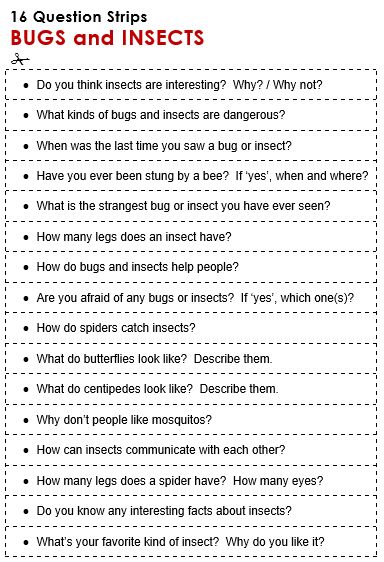 To develop a daily routine for an infant means to draw up a schedule for feeding, sleeping, bathing and walking, which contributes to the normal physical and mental development of the child. It is important that the given rhythm is convenient for both the baby and all family members. nine0003
To develop a daily routine for an infant means to draw up a schedule for feeding, sleeping, bathing and walking, which contributes to the normal physical and mental development of the child. It is important that the given rhythm is convenient for both the baby and all family members. nine0003
When can you start accustoming your child to a sleep routine? But in the first month after birth, the child's body only adapts to life in new conditions for it, while experiencing stress. Therefore, at first, you should simply observe the newborn: how long he can sleep without a break, how often he asks for food, what excites him, and what acts soothingly. To establish an optimal daily routine in the future, at the initial stage it is worth fully adjusting to the natural needs of the baby. nine0003
It is helpful to record your observations of how the baby sleeps and eats, marking the time. This data will help to identify the rhythm of his life and will serve as the basis for building his daily routine in the future.
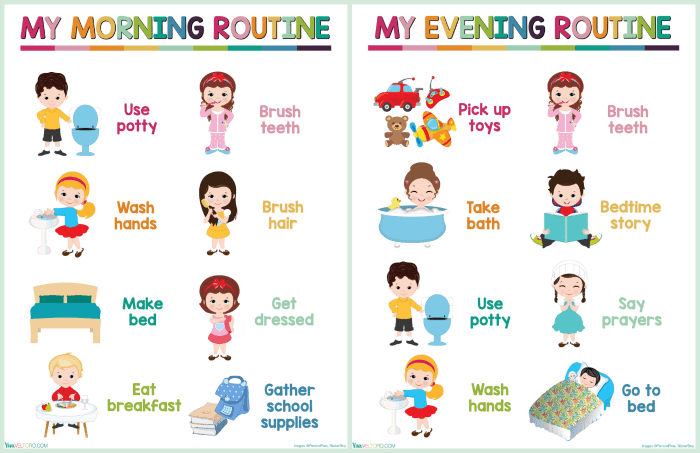
Starting from the age of two months, you can gradually accustom the newborn to the regime, based on some of his already established habits. In order for this process to be successful and painless for all participants, several recommendations should be followed:
- observe consistency and punctuality in everything related to the baby;
- provide the child with a calm environment: exclude loud music, do not watch TV in the children's room;
- refrain from guests in the first months: the appearance of new people can cause anxiety in the crumbs;
- avoid conflict situations in the family.
Benefits of maintenance and exclusion
A child's needs for food, play and rest change at regular intervals. Properly adjusted daily routine helps the baby:
- getting used to distinguishing day from night is a skill that parents will appreciate, especially if the newborn is breastfed and the father cannot replace the nursing mother at night to give the baby a bottle of formula;
- avoid overwork - a small organism at the level of reflexes will know what to expect after certain actions and procedures, which will reduce the energy and time spent on the transition to a new type of activity;
- harmoniously develop mentally and physically - a properly built sequence of successive periods of rest and activity contributes to the most efficient distribution of body resources.
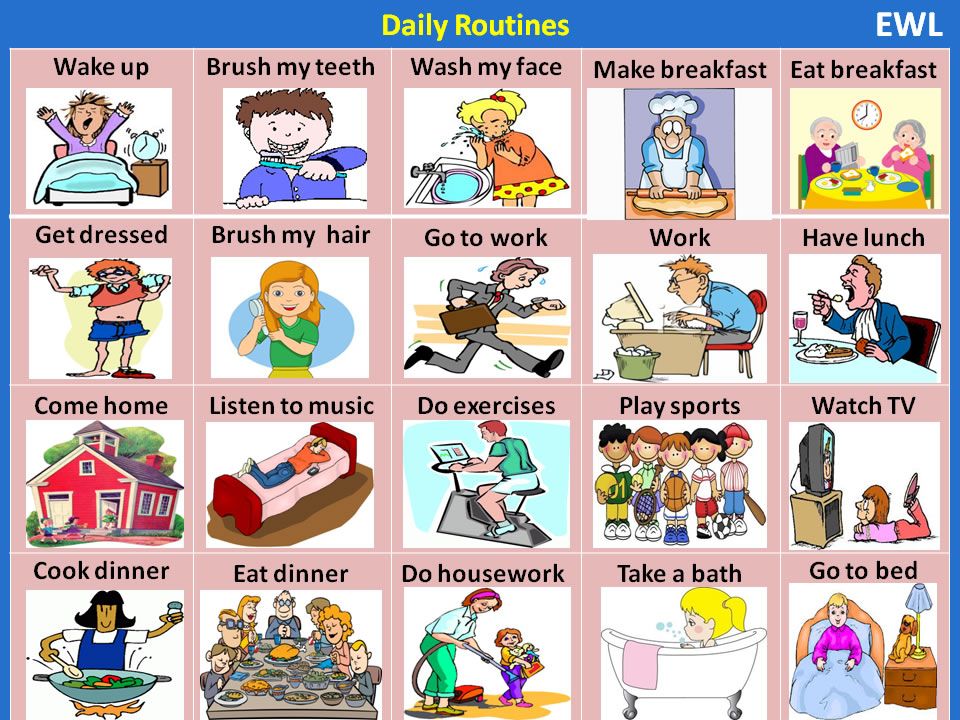 nine0006
nine0006
Just like an adult, a child can get tired earlier than usual or, conversely, get overexcited. In such cases, you cannot demand from him a strict adherence to the regime - do not let him fall asleep until a certain time or try to rock him to sleep, despite the desire to play. Such tactics will not bring joy to either the baby or his parents.
Given that the child develops very quickly, it will not be possible to establish a clear regimen once and for all: during the first year of life, it will have to be changed several times. It is necessary to be sensitive to the changing needs of the baby and adjust the daily routine, while adhering to the timely observance of the basic rituals. nine0003
The importance of rituals in the daily routine of a child
The following types of activities can serve as reference points in the daily routine of a newborn child up to the age of one year:
- bathing;
- gymnastics;
- massage;
- walks;
- games.
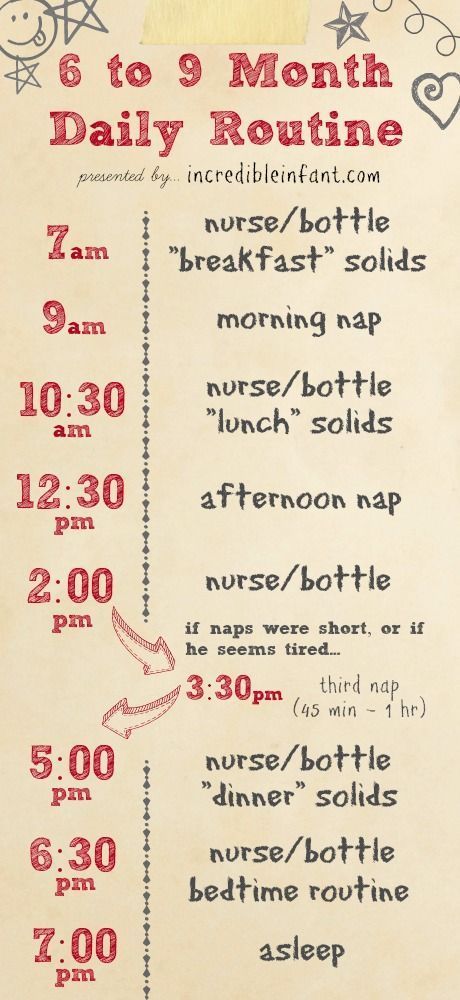
With regard to the primary needs of the body - food and sleep - it is necessary to listen more to the desires of the child, not striving to strictly follow the schedule. This does not mean that feeding and rest should be completely unsystematic - they can and should be organized. If they are successfully inscribed in the sequence of other actions and procedures, then there will be few exceptions to the regime, and it will not be difficult to restore the usual rhythm after them. nine0003
Feeding
Depending on whether the baby is formula-fed or breastfeeding, he may receive food at different intervals and in different quantities: the mixture is easy to measure, but it is difficult to prepare each time on demand, and mother's milk is always ready for use, but measuring how much the baby drank is very difficult. In both cases, it is easy to predict when a child will get hungry, if one remembers that the increase in appetite is facilitated by: nine0006
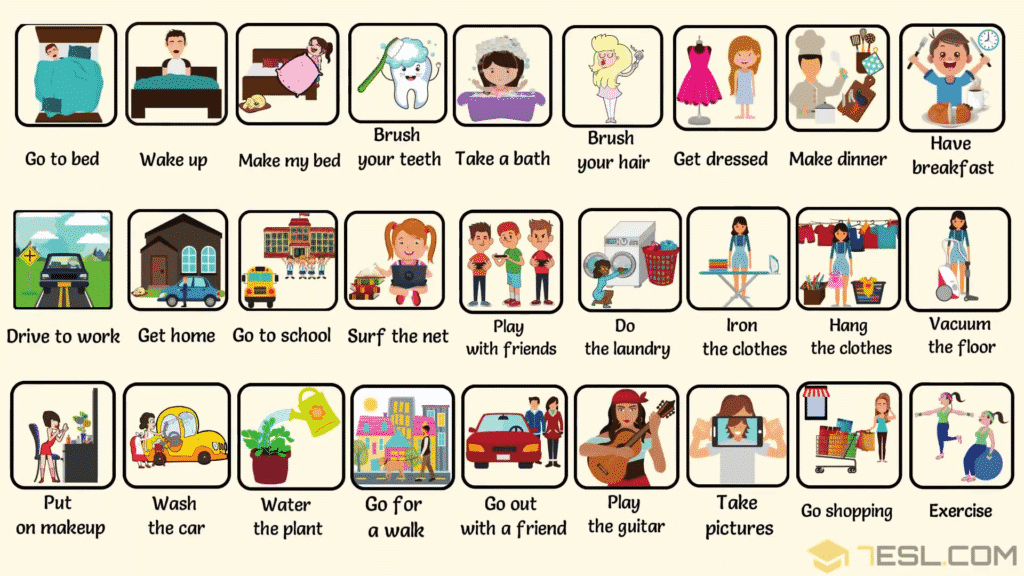
The optimal interval between feedings of a newborn baby in the first 1-2 months of life is 2-2.5 hours. Over time, this gap gradually increases. It is necessary to increase the time between meals up to 4 hours starting from 3-4 months.
A good appetite is a sign of a properly built regimen. If the baby began to eat poorly, you should take care of the state of his health. nine0003
Sleep
The second most important component of a child's routine is sleep. In order to develop a system of day and night rest that suits everyone, you must remember the following.
- During the whole day, and especially before going to bed, the room in which the crib is placed must be well ventilated.
- During the day, sleep should not be accompanied by complete silence and darkness - dim light and moderate noise will help the baby to distinguish the time of day. An ideal afternoon nap is combined with a walk in the fresh air, provided the weather is good.
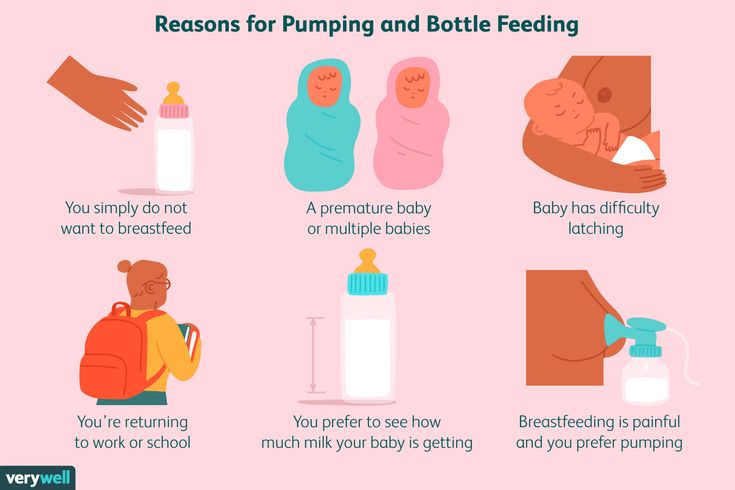 nine0006
nine0006 - Nightly bathing followed by feeding will set the baby up for a long night's rest.
The older the child gets, the longer his periods of wakefulness become. The total duration of sleep per day changes as follows:
- in 1 month - up to 20 hours;
- at 2 months - 17-18 hours;
- from 3 months to six months - 15-16 hours;
- from 6 months to a year - 14-15 hours.
Accordingly, gradually the baby begins to sleep less and less:
- in the first month - 5-6 times a day;
- in six months - 3-4 times;
- at the age of one year - up to 1-2 times.
The quality of a baby's sleep largely depends on what emotions he experienced while awake, and how he slept, in turn, directly affects his mood. The adjusted and convenient mode helps not only to streamline the life of the baby, but also makes him more balanced and cheerful.
ways to improve feeding and sleep patterns, tips
The birth of a child brings about fundamental changes in the daily routine of parents. Caring for a newborn is added to everyday chores, especially in the first months. Sometimes young parents, instead of joy from the birth of a baby, feel constant fatigue and lack of sleep. The negative emotions of the mother are transmitted to the baby, creating a vicious circle. How to accustom a newborn to the regime from the first weeks after birth? After reading the article, you will learn how to set up the process, taking into account the characteristics of the baby's body. nine0003
What is the routine for a baby?
The daily routine is a properly thought-out process of sleeping, feeding and fulfilling other physiological needs of a newborn. It plays an important role in the formation of immunity and the overall full development of the baby.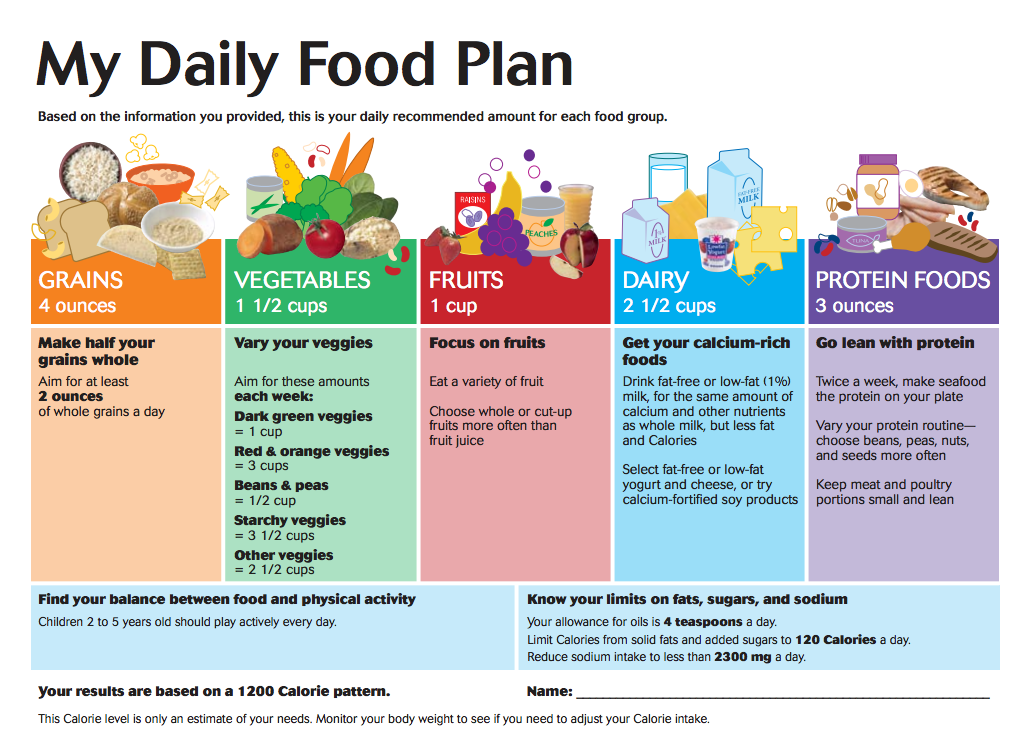 Thanks to the right daily routine, parents can plan their time to combine caring for the baby with household chores and communication with the rest of the family.
Thanks to the right daily routine, parents can plan their time to combine caring for the baby with household chores and communication with the rest of the family.
Learn how to teach a child to sleep through the night. Useful tips...
In the first months of his life, the child mostly sleeps, waking up only to eat....
How to accustom a newborn to the routine? A well-established process has the following main advantages:
- Helps to improve the process of baby's digestion. If you accustom the body to nutrition at a certain time, then this contributes to the timely production of enzymes, gastric juice and improved salivation. All this facilitates the process of digestion. Habitual for infants, colic and gas formation quickly pass. nine0006
- Proper sleep and wakefulness balances the baby's psyche. Indeed, at the age of one month, he assimilates a lot of information. If the baby falls asleep and wakes up at a certain time, then this gives him the opportunity to evenly distribute the load.
 This applies to the period of sleep, when the assimilation of the received information takes place. After waking up, the baby is ready to learn new knowledge.
This applies to the period of sleep, when the assimilation of the received information takes place. After waking up, the baby is ready to learn new knowledge. - The baby, whose daily routine is established, has a calm and long sleep. A baby who constantly gets enough sleep is not capricious and does not cause unnecessary worries to parents. nine0006
A clear daily routine increases the efficiency of all life support processes. The baby's immunity is strengthened, there is energy for playing and exploring the world around him.
2-month-old child: daily routine. Development of a 2-month-old...
Here is your 2-month-old baby, who has changed so much in such a short period of time... in the maternity home. Indeed, in the department, the regimen is common for all children, without taking into account the characteristics of the baby's body. nine0003
How to accustom a newborn child to the daily routine? As a basis, you can take a routine that applies to all children, but it is more advisory in nature.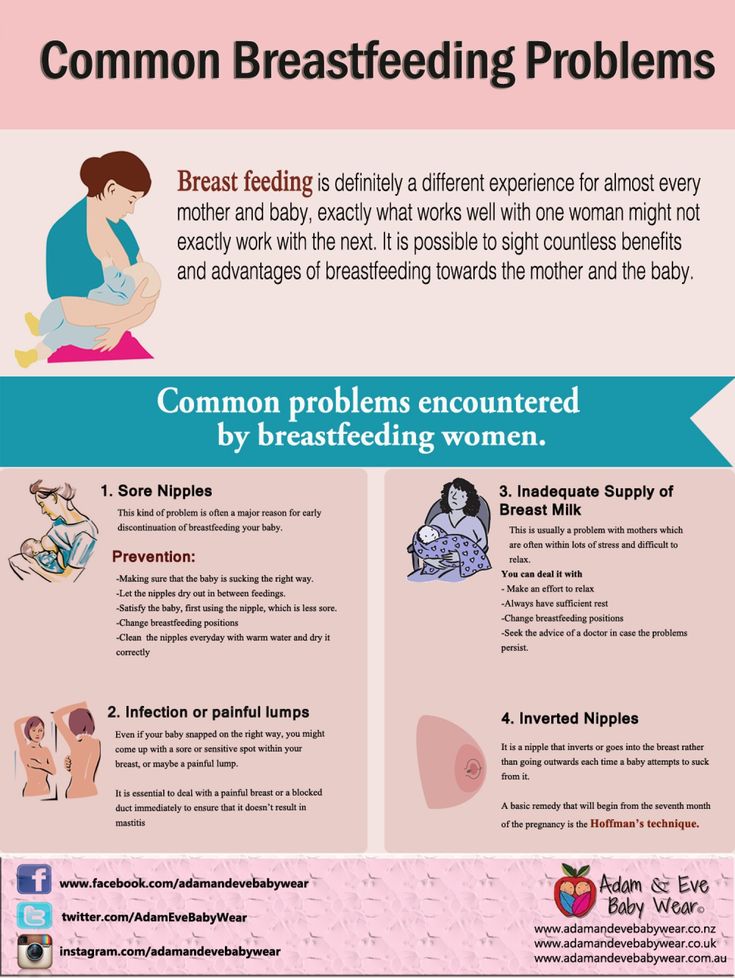 When drawing up an individual schedule, they usually focus on the biological rhythms and characteristics of each child.
When drawing up an individual schedule, they usually focus on the biological rhythms and characteristics of each child.
In Soviet times, doctors insisted that everything be done by the hour. Pediatricians recommended taking a break between feedings for 3 hours, even if the baby is crying and wants to eat. Currently, medicine approaches such issues more flexibly. nine0003
Doctors most of all pay attention only to the sequence of the day: getting up, exercising, feeding, sleeping, walking, massage, and so on. It is allowed to make small deviations of 20-30 minutes. It is much more important to accustom the baby to the chosen daily routine without unnecessary worries. Well-known pediatricians believe that up to 6 months it depends on the desire of the child.
Find out when you can give a pacifier to a newborn:...
A pacifier is an essential attribute and companion of most newborns. Opinions on its use...
After returning from the hospital, parents need to take a closer look at the baby in order to understand its natural biorhythms.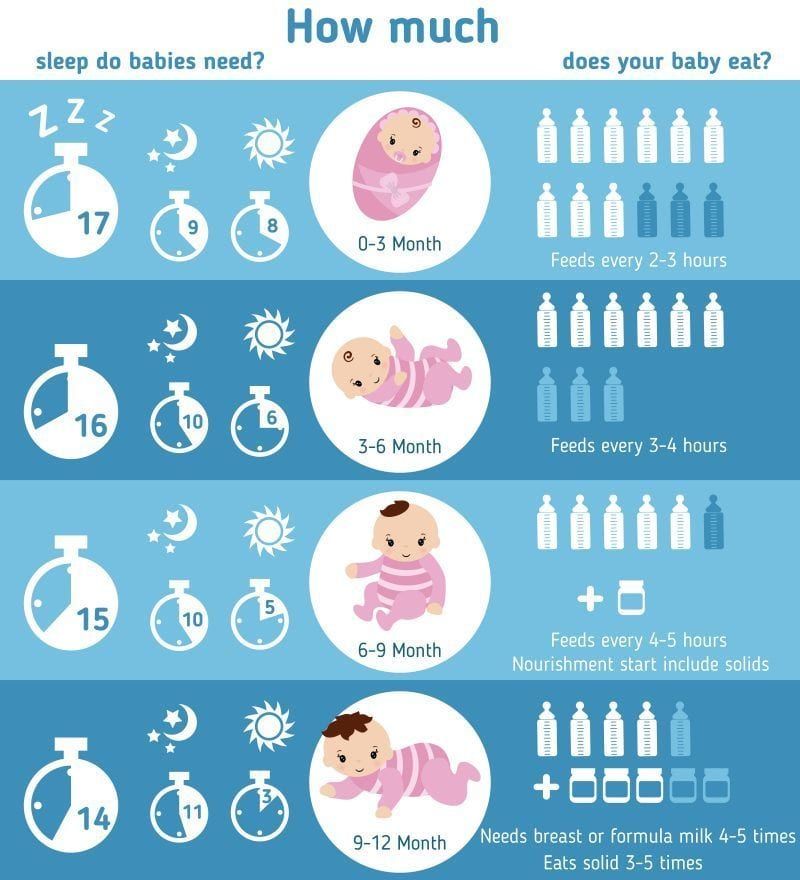 In the first 2-3 weeks, the baby only sleeps and eats. On average, feeding occurs 8-10 times a day. It is based on food intake that they make up the general regimen of the day and determine whether it is suitable for the baby.
In the first 2-3 weeks, the baby only sleeps and eats. On average, feeding occurs 8-10 times a day. It is based on food intake that they make up the general regimen of the day and determine whether it is suitable for the baby.
What should be the regime?
In the first days after returning from the hospital, a young mother does not have enough time to perform all the necessary procedures. The daily routine of a one-month-old baby consists of the following:
- waking up, diaper change, feeding, short waking hours;
- sleep at home or on the street;
- waking up, diaper change, feeding and little wakefulness;
- dream and everything repeats from the beginning;
- Bathing takes place in the evening, approximately between 7 and 9 o'clock.
When is the best time to accustom a child to the routine? This should be done in the most difficult first month. Despite all the difficulties, parents need to find the strength in themselves and create the right daily routine.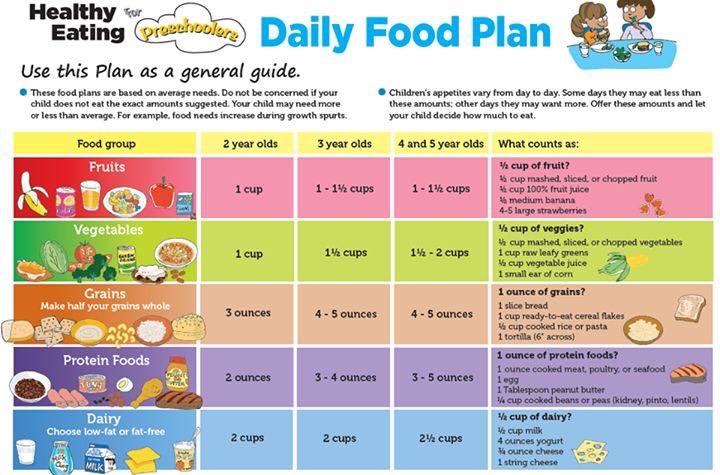 The task is difficult, but doable. nine0003
The task is difficult, but doable. nine0003
How to teach a child to sleep and eat?
Caring for a newborn is a complex task. Many young mothers get very tired, trying to give him more of their attention.
How to accustom a two-month-old child to the regimen? Parents sometimes think that the baby is still too small for this. Experts believe that 2-month-old children are able to get used to a clear daily routine.
Parents should not hurry. If the child was born prematurely, then it is better to consult a doctor about establishing a regimen. In the first months, weak babies should eat on demand, not by the hour. This allows you to gain weight faster. nine0003
How to accustom a newborn to the daily routine? When the baby is sleeping, then the mother should also rest. Parents can begin to accustom the baby to the routine, starting from 1 month. It completely depends on the characteristics of the body of the child himself. In the first weeks, the baby is adapting to the world around him.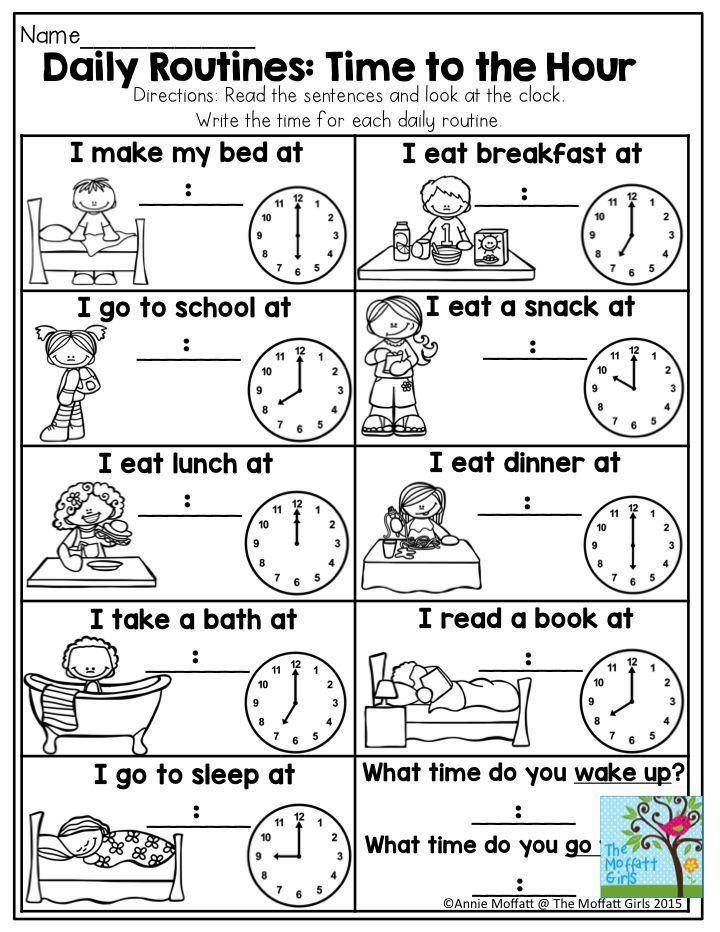 Parents should help him, carry him in his arms and feed him on demand. The first month is quite chaotic, but then it will definitely be easier.
Parents should help him, carry him in his arms and feed him on demand. The first month is quite chaotic, but then it will definitely be easier.
The role of feeding
How to teach a newborn to a feeding schedule? The child, being in the womb, received food constantly, he did not feel a lack of it. After birth, he will have to be fed on demand, because the mother will not be able to endure constant crying. nine0003
In the first month after the birth of the baby, you need to feed every 2-3 hours, and then the intervals should increase. For a child, frequent attachment is necessary not only to receive food, but also as a communication. Close contact with the mother gives him a sense of security. For a woman, constant application helps to establish the process of lactation, as well as avoid stagnation of milk in the breast.
How to accustom a child to a diet? At first, it is difficult to feed the baby after 4 hours, he will require food every 2-3 hours. No need to deny the baby in his desire to eat. The interval of 4 hours between feedings can be increased, starting from 3-4 months. If the child cries and demands food after 2 hours, then the mother can give him some water. Over time, he will be able to get used to a longer period of time between feedings. nine0003
The interval of 4 hours between feedings can be increased, starting from 3-4 months. If the child cries and demands food after 2 hours, then the mother can give him some water. Over time, he will be able to get used to a longer period of time between feedings. nine0003
The process is built differently with artificial feeding. The diet and the amount of the mixture is determined by the pediatrician. It depends on age, weight and physical condition. Feeding the baby does not occur on demand, but has certain time intervals.
Feeding at night: features
How to accustom a newborn to a feeding schedule? At this time, you should not turn on bright lights, and it is best to communicate with the baby in a whisper. In order for mother and child to have a good rest, it is necessary to arrange joint sleep. And the baby will sleep better if he feels her nearby. nine0003
Some babies may wake up at 2 am to get a meal. If this does not happen, then there is no need to wake him up, perhaps the feeling of hunger is not so strong and does not bother him.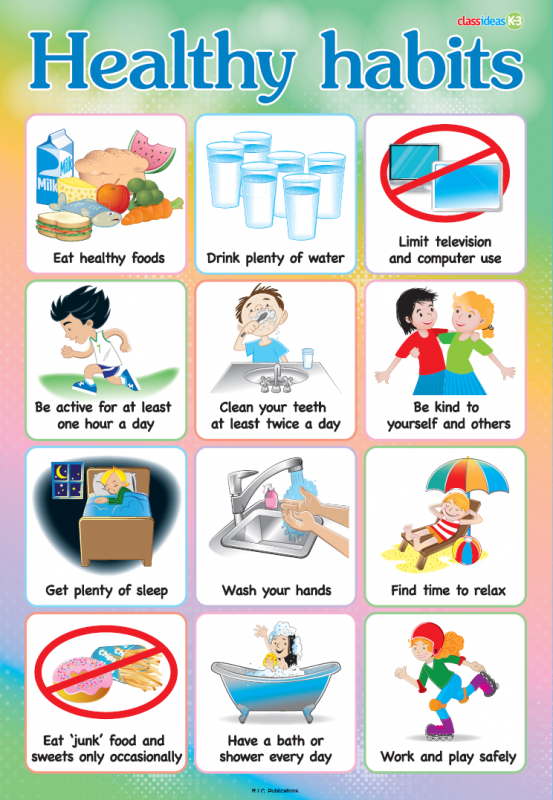
If the child is naughty in the middle of the night, then the mother should not feed him, it is better to give him some warm water. Perhaps he will calm down and fall asleep. If the baby cannot fall asleep within 30 minutes, then he needs to be fed.
The sleep process
How to teach a newborn to sleep? In the first 2 weeks after birth, the baby sleeps 18-20 hours a day. From about the 14th day, periods of wakefulness become longer. nine0003
The baby's physiological rhythm does not obey the daily rhythm, but includes an interval from 90 to 180 minutes. At the 2nd month, his organs of hearing and vision begin to actively develop, he is able to distinguish between day and night by the light and noise level in the apartment.
Gradually, a daily rhythm is established in the baby. The duration of sleep depends entirely on the physiological maturity of the child, as well as on the care activities carried out at the same time.
On average, a child sleeps 19-20 hours, waking up after 4 hours, and his wakeful period is from 30 minutes to 1.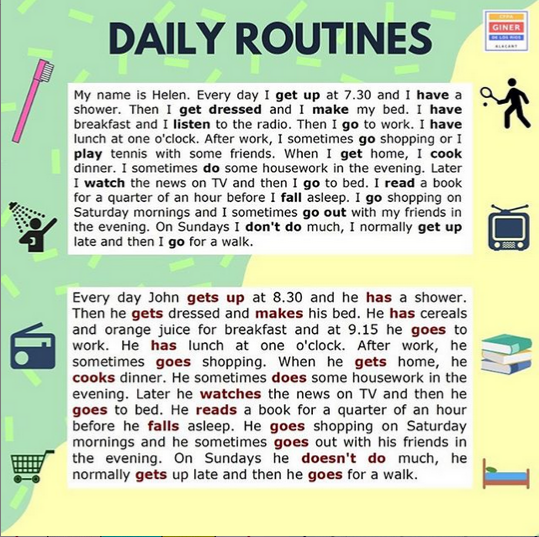 5 hours.
5 hours.
Adequate sleep is necessary for the baby to maintain mental and physical health. With the right mode, the psychological protection of the body occurs.
After 3 months the baby sleeps 16-17 hours a day. At the same time, the mode of sleep and feeding is very closely related. At night, the baby sleeps 9-10 hours, and during the day - 4-5 hours.
In the second half of the year there is a surge in muscle activity. The duration of sleep at night is 10-12 hours, and during the day he sleeps twice for 1.5-2 hours. nine0003
Towards the end of the first year of life, the infant develops a desire for independence and often protests being put to bed. The duration of night sleep is 11-12 hours, and daytime sleep is 1.5 hours 2 times a day.
Hygiene procedures
How to accustom a newborn to a routine? Parents should start a new day with washing, washing the baby and changing the diaper. This will signal the coming of the morning. After six months, parents should wash their hands before feeding and after returning from a walk. nine0003
Bathing in the evening is one of the best ways to help you sleep soundly. After the procedure, a tired and hungry baby is fed and put to bed. According to the pediatrician Komarovsky, this is an excellent option for newborns.
Bathing can be carried out immediately after returning from the hospital. The bath should be with warm boiled water and decoctions of herbs (chamomile, string). Temperature - 36-37 degrees.
Duration of bathing - 5 minutes. Then the parents should treat the navel and folds of the baby. nine0003
At 3-4 weeks old, the newborn can be moved to a large bathroom using a special device - a circle.
Walking mode with the baby
From the 7th day of a newborn's life in the warm season and from the 10th day in the cold season, parents should walk with him outside. Usually, the child sleeps better and longer in the fresh air than at home. With this in mind, parents should properly organize his feeding.
If the baby does not wake up at the appointed time, then the mother should gently wake him up and offer him something to eat.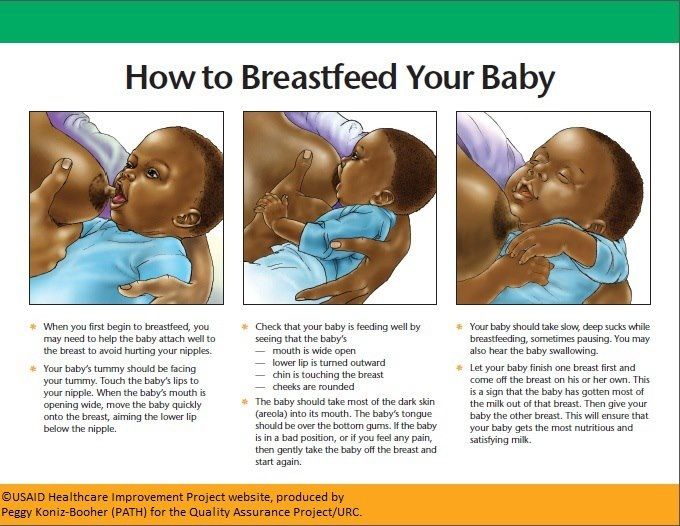 You need to find compromises to create a comfortable regime for feeding, sleeping and walking. nine0003
You need to find compromises to create a comfortable regime for feeding, sleeping and walking. nine0003
Positive aspects
How to accustom a newborn to the routine? If the parents can arrange the baby's daily routine:
- A young mother gets enough free time. In those hours when the baby is sleeping, parents can go about their business or themselves.
- The newborn is well fed, in a clean and dry diaper, is in a good mood and cries little. His good mood allows him to engage in developmental activities.
- Mom has every opportunity to plan her day. A clear schedule helps to distribute your time, which is very convenient. This allows you to deal with urgent matters (paperwork). nine0006
- The newborn develops a correct sense of time. If the daily routine is correct, then he will not be able to confuse day and night.
The regime lays an excellent foundation for future education. If you stick to it constantly, it will help to avoid problems in the future.



